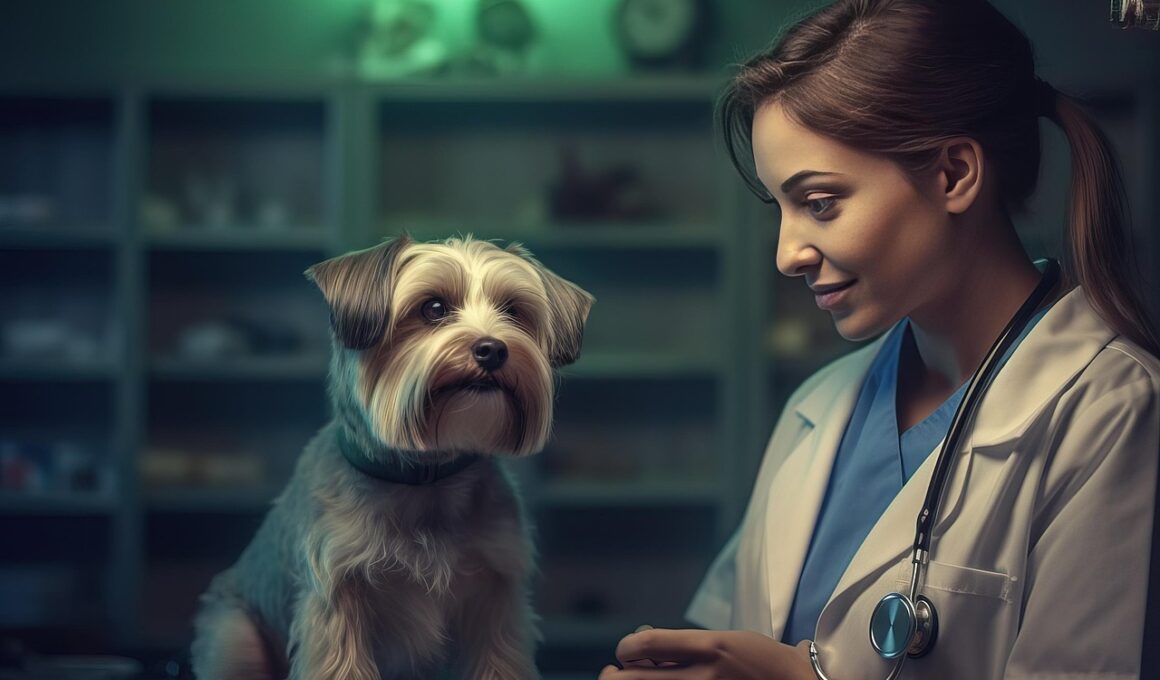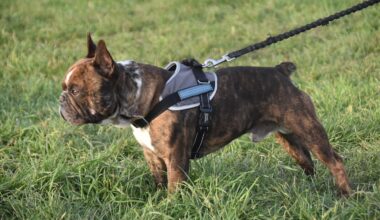Dietary Considerations Following Vaccine Allergies in Dogs
As dog owners, understanding dietary considerations after vaccine allergies is crucial. Vaccinations protect our dogs, but they can have adverse reactions, including allergies. Symptoms may range from mild skin irritations to severe anaphylactic reactions that can threaten life. Identifying and managing these allergies is essential for your dog’s overall health. One of the most effective methods is through diet modification. If your dog experiences an allergic reaction post-vaccine, consulting with a veterinarian to identify specific allergens is advisable. Often, these reactions can stem from certain ingredients in vaccines or even environmental factors. An elimination diet can help determine what may be causing the allergies. Consider discussing hypoallergenic diets that focus on easily digestible proteins and carbohydrates, while avoiding common allergens. Always monitor your dog’s response to dietary changes, as it may help identify further allergies. Keep in mind that while some dogs may face food allergies, others might react differently. Proper management may involve food supplements designed to boost the immune system. Feeding your dog a balanced diet tailored to his needs can significantly influence their recovery.
Types of Allergies and Symptoms
Understanding the different types of vaccine reactions and their symptoms is pivotal for all dog owners. Allergies may occur immediately or manifest later, creating confusion. Common reactions include skin issues, such as hives or itching, gastrointestinal disturbances, including vomiting and diarrhea, along with behavioral changes. Observing your dog closely for any unusual symptoms following a vaccination is necessary. Document the symptoms to discuss with your veterinarian, creating a clearer picture of the potential underlying issues. For example, if your dog shows persistent gastrointestinal problems, it might relate to the vaccine components or additives. Some dogs may have reactions to the preservatives or even the proteins contained in the vaccine. Notably, consulting with a vet about your dog’s health history could provide insights into predisposed conditions such as autoimmune diseases. Immediate detection will enhance treatment options. Additionally, it’s essential to understand that diet can impact allergic reactions. By managing stress through a balanced diet and supplements meant to support the immune response, you can better assist your dog during their recovery phase. Always maintain an open line of communication with your veterinarian throughout the process.
When addressing dietary changes after vaccine reactions, prioritize nutrient-rich, hypoallergenic options. High-quality proteins, such as lamb, duck, or fish, are excellent choices to support recovery. Replace grains and fillers often found in low-quality foods with fruits and vegetables, as they provide essential vitamins and minerals. Incorporating fiber-rich sources, like sweet potatoes or pumpkin, is beneficial for digestive health. Always break down the feeding process into smaller, frequent meals to avoid overwhelming your dog’s stomach. Furthermore, consider adding omega-3 fatty acids, which help alleviate inflammation and promote skin health. Fish oil or flaxseed oil are great options to explore. Monitoring your dog’s weight will also help ensure they receive appropriate nutrition without excess. Exposure to allergens can be minimized by choosing limited-ingredient dog foods that help pinpoint specific intolerances. Always read food labels thoroughly, checking for hidden allergens that can cause reactions. While selecting any new diet, transition carefully over a week to prevent gastro-intestinal disturbances. Collaboration with your veterinarian is crucial in selecting the right dietary plan tailored to your dog’s unique needs and health challenges, ensuring overall recovery and improving quality of life.
Incorporating Supplements
Incorporating supplements into your dog’s diet is another consideration post-vaccine reactions. Certain vitamins can assist in strengthening the immune system, promoting healing and reducing inflammation. For instance, Vitamin E and C are powerful antioxidants that may play roles in recovery. Probiotics are also invaluable for maintaining gut health and bolstering immunity. They work by returning the balance of beneficial bacteria within your dog’s digestive tract after a vaccine reaction. The proper dosage and type of supplement are crucial, hence, discussing with your veterinarian is essential. Supplements should be considered as part of a comprehensive recovery strategy rather than a standalone remedy. Furthermore, always opt for veterinary-approved supplements to ensure their safety and efficacy. Inspect the product for signs of high-quality manufacturing, such as certifications or testing standards. Additionally, be cautious of any potential interactions these supplements might have with your dog’s current medications. As with dietary changes, introduce any new supplements gradually, monitoring for adverse reactions. This process will help confirm if the supplements are beneficial or if they contribute to further complications. In summary, supplements can play a pivotal role in optimizing your dog’s health after allergy responses.
Monitoring your dog closely during dietary transitions is equally important to assess any changes in their condition. Continue to collaborate with your veterinarian throughout the recovery period. After a vaccination allergy episode, document any improvements or regressions you observe post-diet modification. Consistent observation allows for timely adjustments to their diet or treatment plan. If symptoms persist despite dietary changes, further testing may be needed to identify other underlying issues. Checking for secondary infections or additional allergies is crucial since these conditions can arise following adverse vaccine reactions. Implementing a structured routine for feeding and exercise will further aid your dog’s overall wellbeing. A calm environment along with routine feeding practices can promote healing. Engaging with your dog mentally and physically through play can also alleviate stress during recovery. There are various resources available online providing additional guidance on managing food allergies and vaccine reactions. Reliable sources include veterinary websites and dog health forums. Ensuring your dog’s overall health after vaccinations will take time and patience but ultimately contributes to a fulfilling life. Remember that early interventions and careful monitoring can lead to more positive outcomes in managing your dog’s health.
The Role of Hydration
Hydration plays a vital role in your dog’s recovery journey after experiencing vaccine allergies. Providing fresh, clean water must become a routine part of caring for your pet post-vaccination. Adequate hydration supports bodily functions and assists in managing reactions effectively. Ensuring your dog drinks enough water can help flush out toxins and allergens from their systems. Consider using water bowls that promote drinking, such as automatic fountains that keep water cool and fresh. Monitoring your dog’s water intake will be crucial, particularly if they exhibit gastrointestinal symptoms or lethargy. Encourage hydration by adding flavor to the water using low-sodium broth, which can entice your dog to drink more, especially in times of distress. It’s also wise to provide ice cubes as a form of enrichment that can help cool them down, especially if they feel feverish. Additionally, hydrating foods such as watermelon or cucumber can serve as treat alternatives with added benefits. Always consult your vet regarding the best practices for maintaining hydration tailored to your dog’s recovery process. Keeping your furry friend hydrated can significantly impact their overall health and wellbeing after vaccine reactions.
Ultimately, the path to recovery for dogs experiencing vaccine allergies requires a systematic and holistic approach. Pairing dietary modifications, supplements, and focused care can significantly mitigate adverse reactions. Engage consistently with your veterinarian for advice tailored to your dog’s specific needs. Each dog is uniquely different, requiring personalized strategies for dietary management after allergies. The goal is to create a nurturing environment where your dog feels supported and understood during their recovery. Remember, patience is key in observing dietary changes, as healing takes time and adjustment. Building a solid support network—including holistic pet care professionals—can also provide additional resources and strategies. Stay informed about the latest studies on dog nutrition, immune health, and vaccine reactions for better decision-making. Enhance your understanding of how foods and supplements work together to support recovery holistically. Finally, create a loving home atmosphere that contributes to your dog’s emotional and physical wellbeing, ultimately promoting recovery. A healthy, happy dog is a testament to diligent care, informed decisions, and understanding the balance between vaccinations and dietary needs.
In conclusion, addressing dietary considerations following vaccine allergies in dogs involves recognizing symptoms, making informed food choices, and incorporating beneficial supplements. The journey may initially seem overwhelming, but with consistent effort and professional guidance, dog owners can significantly improve their pets’ quality of life. Staying vigilant during the recovery period ensures that potential allergens are effectively managed. In shared experiences within your pet community, you may find valuable insights that can bolster your confidence in managing allergies. Every dog reacts differently, thus tailoring their dietary needs must remain a priority. Further education about dog health care and nutrition will empower pet owners in creating a proactive approach to their pets’ health. Never hesitate to seek professional assistance when navigating these complexities. Ultimately, with proactive measures and the right diet, dogs can continue to thrive post-vaccination, enjoying their lives with minimal discomfort. Remember, a balanced diet coupled with attention to specific needs can enhance the life of your furry friend. Continue to educate yourself using trusted resources and share knowledge with fellow dog owners. In the end, a dog’s health is the responsibility of their owner, and informed decisions lead to happier, healthier companions.


